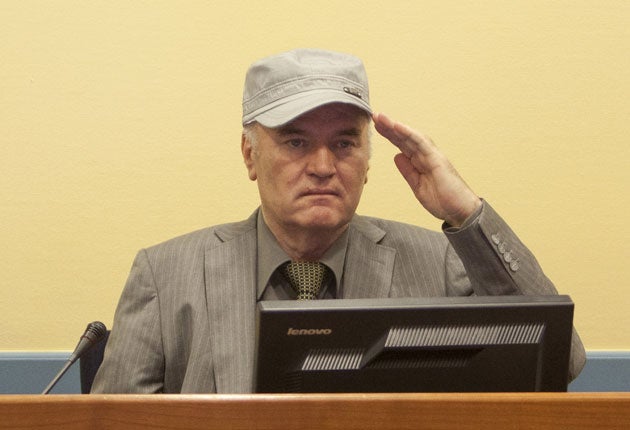Ratko Mladic: Hague to rule on former Serbia military chief’s appeal against genocide conviction
‘Butcher of Bosnia’ was found guilty of genocide for leading 1995 Srebrenica massacre

Former Bosnian Serb military chief Ratko Mladic is set to hear if UN judges have upheld or overturned his convictions for masterminding genocide in the former Yugoslavia during the 1990s.
Mladic – known as the “butcher of Bosnia” for leading troops responsible for a string of deadly campaigns, including the 1995 Srebrenica massacre – was convicted in 2017 and sentenced to life imprisonment.
The 78-year-old will appear for an appeal hearing at UN-backed proceeding at The Hague in the Netherlands on Tuesday.
Widows and mothers of victims will be in court to hear the judgment by a five-judge panel, led by Zambian presiding judge Prisca Matimba Nyambe, on Mladic’s appeal against his genocide conviction.
The rulings will effectively wrap up UN prosecutions of crimes committed in the Bosnian war of 1992 to 1995 that left more than 100,000 dead and millions homeless.
Mladic was found guilty of genocide for leading the 1995 massacre in the eastern enclave of Srebrenica of more than 8,000 Muslim men and boys – the worst massacre on European soil since the Second World War.
Mladic was also found guilty of other crimes including persecution, extermination, murder and terror.
He was acquitted of a second genocide charge linked to a campaign to drive non-Serbs out of several towns early in the war. Prosecutors appealed against that acquittal.
Mladic’s former political leader, Radovan Karadzic, was also convicted of the same crimes and is serving a life sentence.
Mladic was first indicted in July 1995. After the war in Bosnia ended, he went into hiding and was finally arrested in 2011 and handed over to the ICTY by the then-ruling pro-Western government of Serbia.
Mladic’s appeal and other legal issues left over from the tribunal are being dealt with by the UN’s international residual mechanism for criminal tribunals – housed in the same building as the now-defunct court for the former Yugoslavia.
At the request of the UN prosecutor Serge Brammertz, the court is set to rule on a further charge of genocide against Mladic. Earlier this week, Mr Brammertz said he was “cautiously optimistic” about Tuesday’s hearing.
Mladic and his legacy still divide Bosnia. Bosniaks, mostly Muslims, view him as a villain and war criminal while many Bosnian Serbs still consider him a hero.
“I cannot accept any verdict,” Serb war veteran Milije Radovic, from the eastern Bosnian town of Foca, told the Associated Press. “For me, he is an icon. And for the Serb people, he is an icon.”
Join our commenting forum
Join thought-provoking conversations, follow other Independent readers and see their replies
Comments
Bookmark popover
Removed from bookmarks